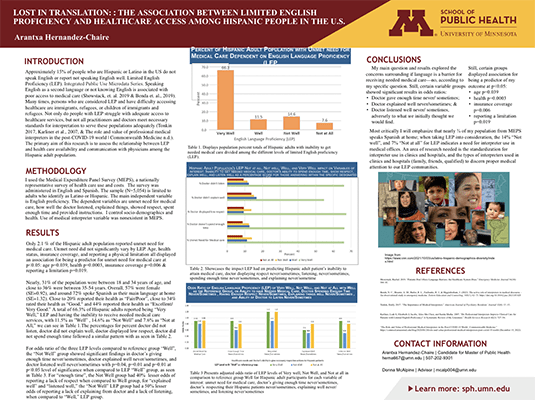Arantxa Hernandez-Chaire
MPH, Public Health Administration & Policy
Advisor:
Donna McAlpine
Keywords:
LEP; Healthcare
Abstract
Objective: Approximately 15% of people who are Hispanic or Latino in the US do not speak English or report not speaking English well. Limited English Proficiency (LEP) may be associated with poor access to quality medical care. The primary aim of this research is to assess the relationship between LEP and health care availability and communication with physicians among the Hispanic adult population.
Methods: I used the Medical Expenditure Panel Survey (MEPS), a nationally representative survey of health care use and costs. The survey was administered in English and Spanish. The sample (N=5,054) is limited to adults who identify as Latino or Hispanic. The main independent variable is English proficiency. The dependent variables are unmet need for medical care, how well the doctor listened, explained things, showed respect, spent enough time and provided instructions. I control socio-demographics and health.
Results: About 23% of the Hispanic/Latino adult population report that they either do not speak English or do not speak it well. Preliminary results suggest that persons who are LEP are more likely to report that their physician did not explain things well and that they did not provide information. Multivariate analysis will examine experiences of care and unmet need controlling for other demographics and health status.
Conclusion: The results indicate that the LEP Hispanic population are more likely to report communication problems with physicians (how well doctors explain things and give instructions). The findings emphasize the need for quality interpreter services.

